This article examines the pivotal trends shaping success in the food and beverage sector of the hotel industry. It underscores the critical importance of:
By detailing how these trends align with evolving consumer preferences, the article illustrates their role in enhancing guest satisfaction, fostering loyalty, and improving overall financial performance for establishments that embrace these changes.
The food and beverage sector within the hospitality industry is experiencing a significant transformation, propelled by shifting consumer preferences and an escalating demand for sustainability. As establishments work diligently to enhance guest experiences and optimize profitability, they are adopting ten pivotal trends that are set to redefine their culinary offerings. These trends—ranging from sustainable sourcing and health-conscious menus to the integration of technology and personalized dining experiences—not only cater to the needs of modern travelers but also pose distinct challenges for hotel operators.
How can hotels adeptly navigate this evolving landscape to meet the expectations of today’s discerning guests while remaining competitive in an increasingly crowded market?
Lights On is revolutionizing revenue management in the hospitality industry through advanced analytics and customized strategies. This innovative approach addresses the pressing need for and demand generation, empowering hotels and restaurants to adapt their offerings in response to evolving market trends.
By leveraging data-driven insights, clients can make strategic decisions that enhance occupancy rates and revenue streams. Consequently, businesses can achieve improved financial performance, with advanced analytics playing a crucial role in identifying opportunities and mitigating challenges in a competitive landscape.
Furthermore, the integration of real-time data analysis facilitates dynamic pricing adjustments, ensuring establishments remain agile and responsive to market fluctuations, ultimately driving profitability.
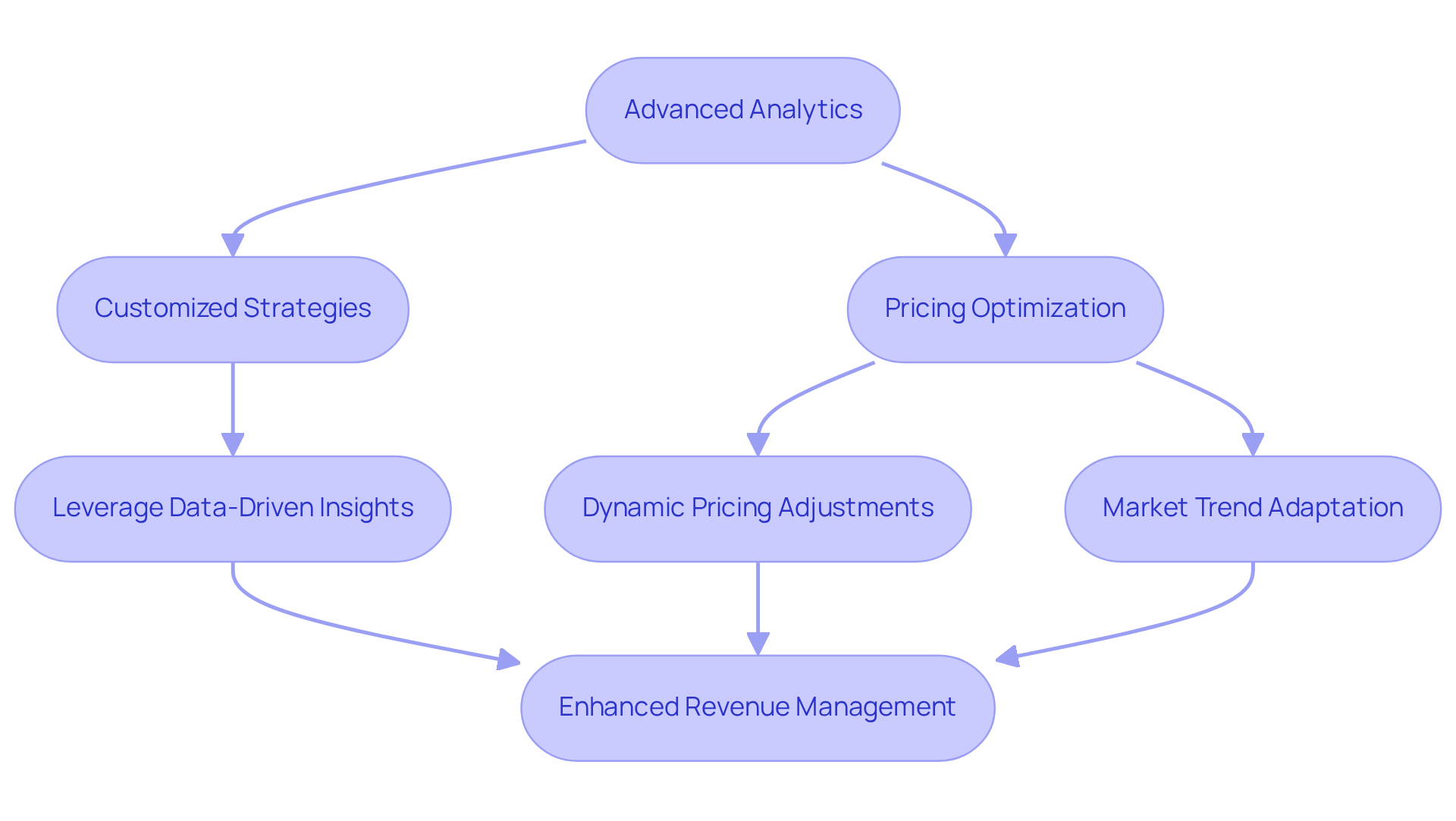
Sustainable sourcing is revolutionizing the hospitality landscape by prioritizing eco-friendly ingredients that significantly mitigate environmental impact. Hotels are increasingly forming partnerships with local farms and suppliers to procure fresh, organic produce. This strategy not only fortifies community support but also elevates the quality of their menus, capturing the attention of a growing number of visitors who in their travel choices.
In fact, as noted by Jordan Hollander, a 2021 study revealed that:
By embracing these eco-friendly practices, establishments can position themselves as leaders in the evolving hospitality sector, addressing the needs of environmentally conscious visitors while simultaneously benefiting their communities. Furthermore, adopting sustainable sourcing strategies can yield a competitive edge, as 71% of C-suite leaders assert that ESG investment represents a competitive advantage for their companies.

The incorporation of technology into the food and beverage hotel industry operations is revolutionizing efficiency and enhancing customer experience within accommodations. Mobile ordering apps, for instance, empower guests to place orders seamlessly from their devices, significantly boosting convenience and satisfaction. This shift not only streamlines the ordering process but also enables establishments to manage dining operations more effectively, thereby reducing wait times and optimizing staff allocation. Notably, 82% of in placing orders at limited-service eateries via smartphone applications, underscoring the growing importance of this technology in elevating customer satisfaction.
Furthermore, data analysis tools are becoming indispensable for the food and beverage hotel industry to understand customer preferences, allowing establishments to tailor their menus and services to meet evolving demands. Firms such as Technomic and Datassential provide valuable insights into culinary trends and customer feedback, enabling establishments to create personalized experiences that resonate with their patrons, ultimately fostering loyalty and encouraging repeat visits. As the hospitality industry increasingly embraces these technological advancements, including AI integration for operational efficiencies, the potential for enhanced service delivery and improved operational efficiency becomes increasingly clear.
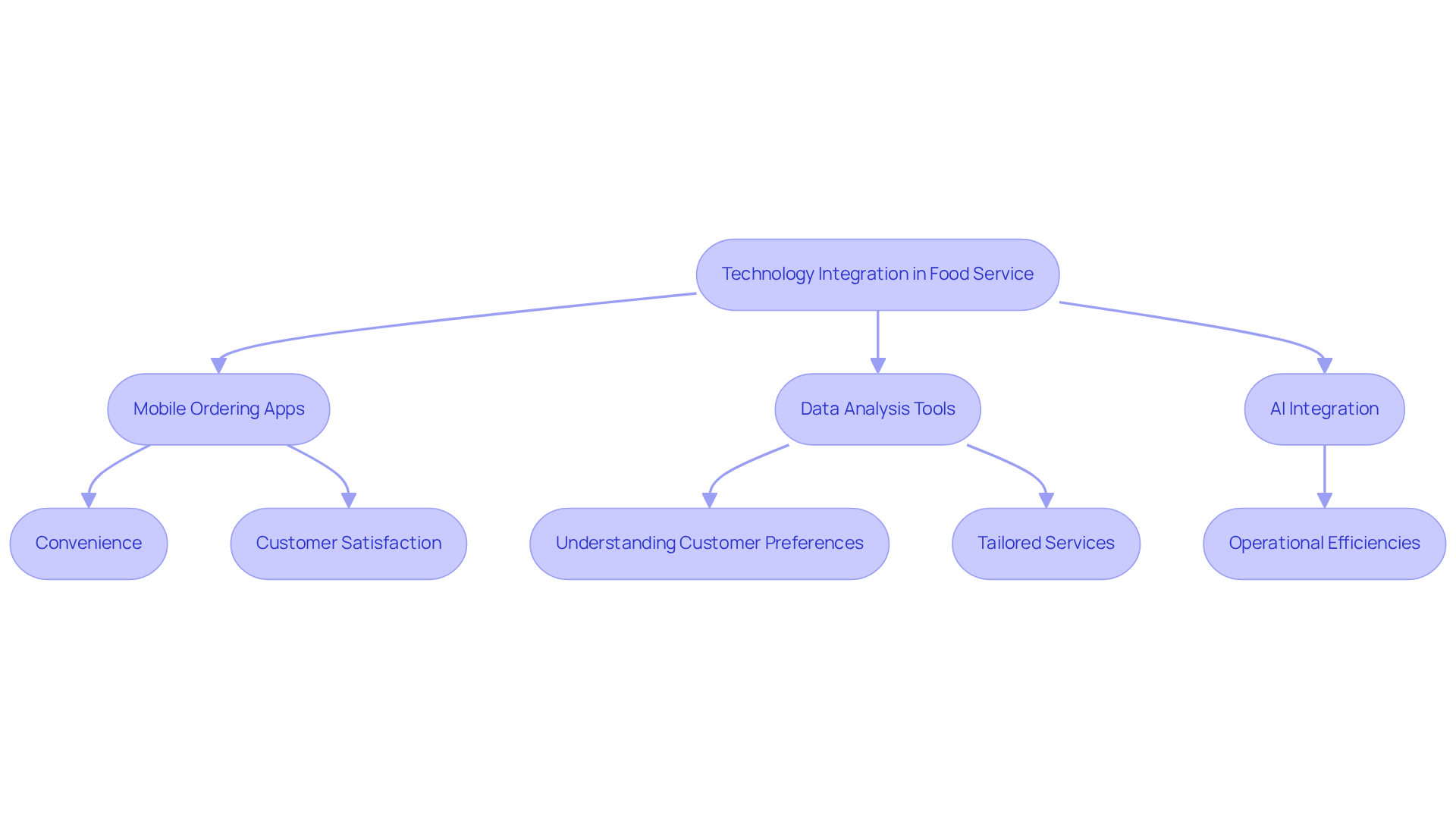
Health-conscious menus are becoming indispensable in the [food and beverage hotel industry](https://opentable.com/restaurant-solutions/resources/hospitality-trends), as guests increasingly prioritize nutritious dining options. In 2025, 54% of Americans intend to dine out more often, highlighting a notable demand for gluten-free options among accommodations.
To address this demand, establishments are incorporating fresh, organic ingredients and focusing on foods with specific benefits, such as supergrains and medicinal mushrooms, while crafting dishes that cater to various dietary needs, including vegan and low-calorie options. This trend not only aligns with consumer preferences but also positions establishments within the food and beverage hotel industry as leaders in wellness-focused dining, enhancing guest satisfaction and loyalty.
Furthermore, as health awareness continues to influence consumer habits, with the worldwide health and wellness industry anticipated to hit $7.32 trillion in 2025, establishments that embrace these shifts can expect higher occupancy rates and enhanced brand recognition.
As Maitrayee Dey notes, 'The food industry is undergoing radical change, driven by consumers who care about their health and want companies to provide healthier offerings and greater transparency.'
To effectively implement these health-conscious menu changes in the food and beverage hotel industry, hotel owners should consider:

Customized meal occasions are vital for enhancing visitor satisfaction. Hotels can achieve this by offering , enabling guests to tailor their meals to their individual preferences. Furthermore, leveraging visitor information to anticipate needs and preferences can create memorable dining experiences that encourage repeat visits and generate positive feedback. By implementing these strategies, hotels not only meet but exceed guest expectations, fostering loyalty and a strong reputation in the competitive hospitality market.
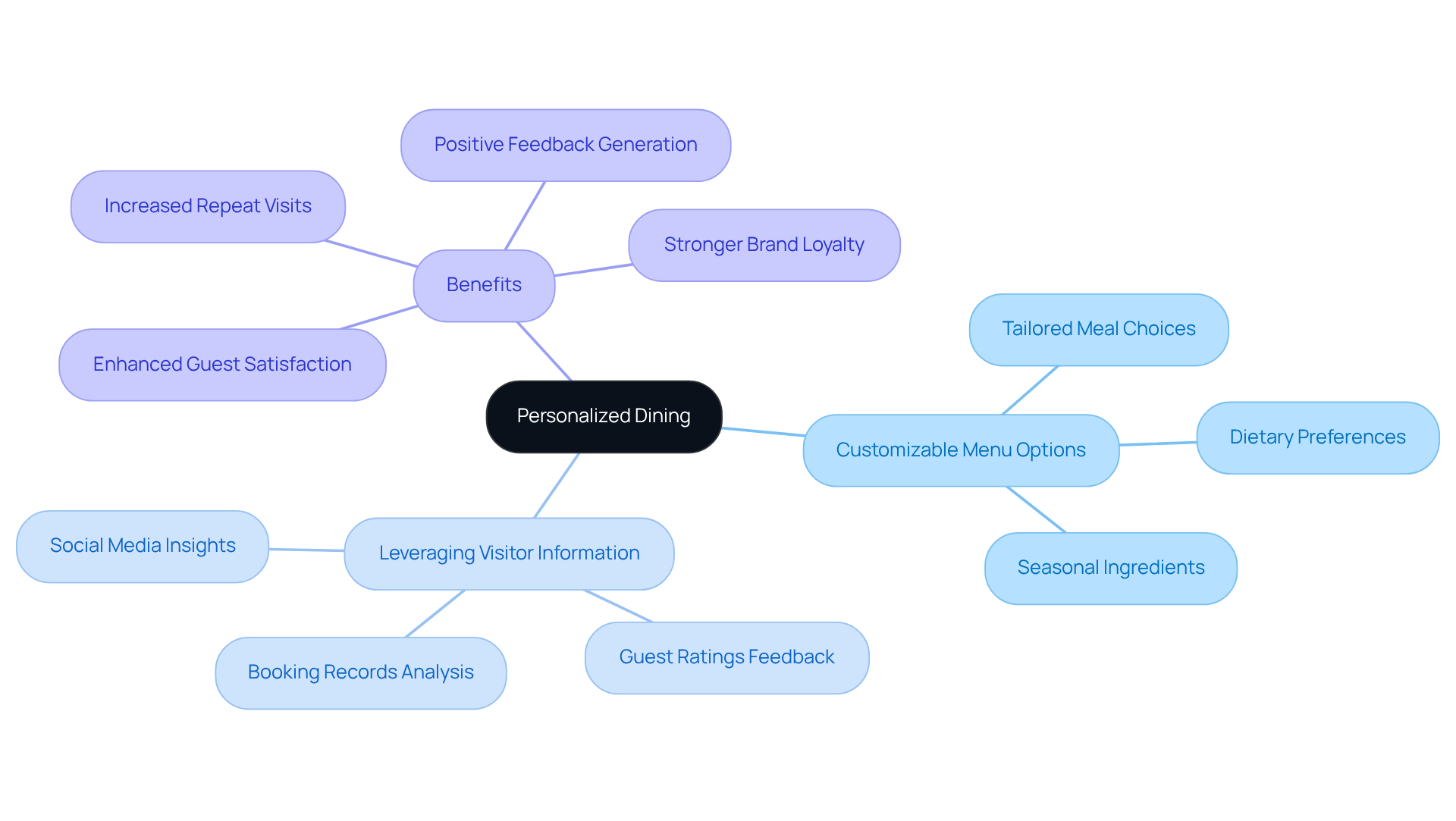
Incorporating international dishes into dining options is essential for venues in the food and beverage hotel industry that aim to attract a varied clientele, thereby increasing their appeal to both local and foreign patrons. By offering meals that showcase diverse cultures, establishments within the food and beverage hotel industry can create distinctive dining experiences that cater to a broad array of tastes and preferences. This trend not only enhances culinary offerings within the food and beverage hotel industry but also enriches overall visitor satisfaction, making stays more memorable.
As travelers increasingly seek customized and authentic experiences, establishments within the food and beverage hotel industry that embrace diverse menus can significantly boost guest satisfaction and loyalty. Notably, 75% of consumers are eager to try new and unique flavors, underscoring the growing demand for culinary exploration.
Furthermore, the trend of presenting international tastes with local adaptations enables businesses in the food and beverage hotel industry to differentiate themselves in a competitive market. The development of inspires contemporary restaurants to experiment with cross-cultural flavors, further enhancing the culinary journey.

Experiential dining transcends conventional meal offerings, transforming the entire dining process into a memorable journey. The food and beverage hotel industry is increasingly embracing themed dinners, interactive cooking classes, and exclusive chef's table offerings that engage visitors in unique ways. These gastronomic journeys not only provide enjoyment but also foster emotional connections, inspiring guests to share their stories with others.
The demand for customized culinary encounters is evident, with 74% of customers indicating they return to establishments after enjoying distinctive opportunities. Furthermore, an OpenTable survey reveals that 42% of diners actively seek out unique events, underscoring this growing trend. Operators who weave storytelling into their culinary concepts—such as themed nights or interactive cooking sessions—are poised to distinguish themselves in a competitive landscape.
For example, F1® Arcade combines cuisine with a high-energy racing atmosphere, exemplifying the successful fusion of entertainment and culinary experiences. As Executive Chef Oscar Cabezas articulates, "People are craving more than just good food. We are eager to connect with our visitors on an emotional level by sharing the stories behind the food, our ingredients, and our staff."
This approach not only enhances visitor engagement but also cultivates loyalty, making an essential strategy for establishments in the food and beverage hotel industry that aim to elevate their culinary offerings. Additionally, with 87% of consumers expressing interest in purchasing products such as cookbooks or cocktail kits from restaurants, the potential for stronger relationships with patrons is unmistakable.

Collaborating with nearby farms, breweries, and artisans enables accommodations to curate unique, locally-sourced menu options that resonate with guests. This strategy not only strengthens the local economy but also enhances the . Notably, 84% of travelers consider ethical sourcing when booking accommodations, highlighting a pronounced preference for establishments that prioritize local partnerships. Guests increasingly value transparency regarding the origins of their food, fostering a deeper connection to the local culture and community. Furthermore, establishments in the food and beverage hotel industry that embrace these collaborations report an impressive 27% increase in food and beverage revenue, coupled with a 33% reduction in supply chain emissions. By weaving regional tastes and narratives into their offerings, accommodations can fortify their brand identity, attract a clientele that values sustainability, and ultimately create memorable experiences that encourage repeat visits. As sustainability becomes crucial for long-term profitability in the hospitality sector, these local sourcing practices play a vital role in waste reduction and environmentally responsible operations.

As the acceptance of plant-based diets continues to rise among patrons, establishments recognize the imperative to diversify their menus with a range of plant-based options. This evolution not only caters to vegans and vegetarians but also aligns with the preferences of health-conscious diners seeking to diminish their meat consumption. By innovatively integrating plant-based ingredients, establishments can amplify their appeal and bolster their culinary reputation.
Notably, major accommodation groups such as InterContinental Hotels Group are leading the charge, committing to a as part of a broader initiative aimed at meeting global sustainability goals and responding to consumer demand for healthier dining choices. Furthermore, the Huazhu Group is set to convert 70% of its menus to plant-based options across its 750 locations, underscoring a significant industry shift toward sustainability, as reflected in their ambitious sustainability objectives.
As consumer preferences evolve, establishments that embrace plant-based dining not only mitigate supply chain risks associated with animal agriculture but also position themselves favorably within a competitive market, ultimately enhancing visitor satisfaction and loyalty.
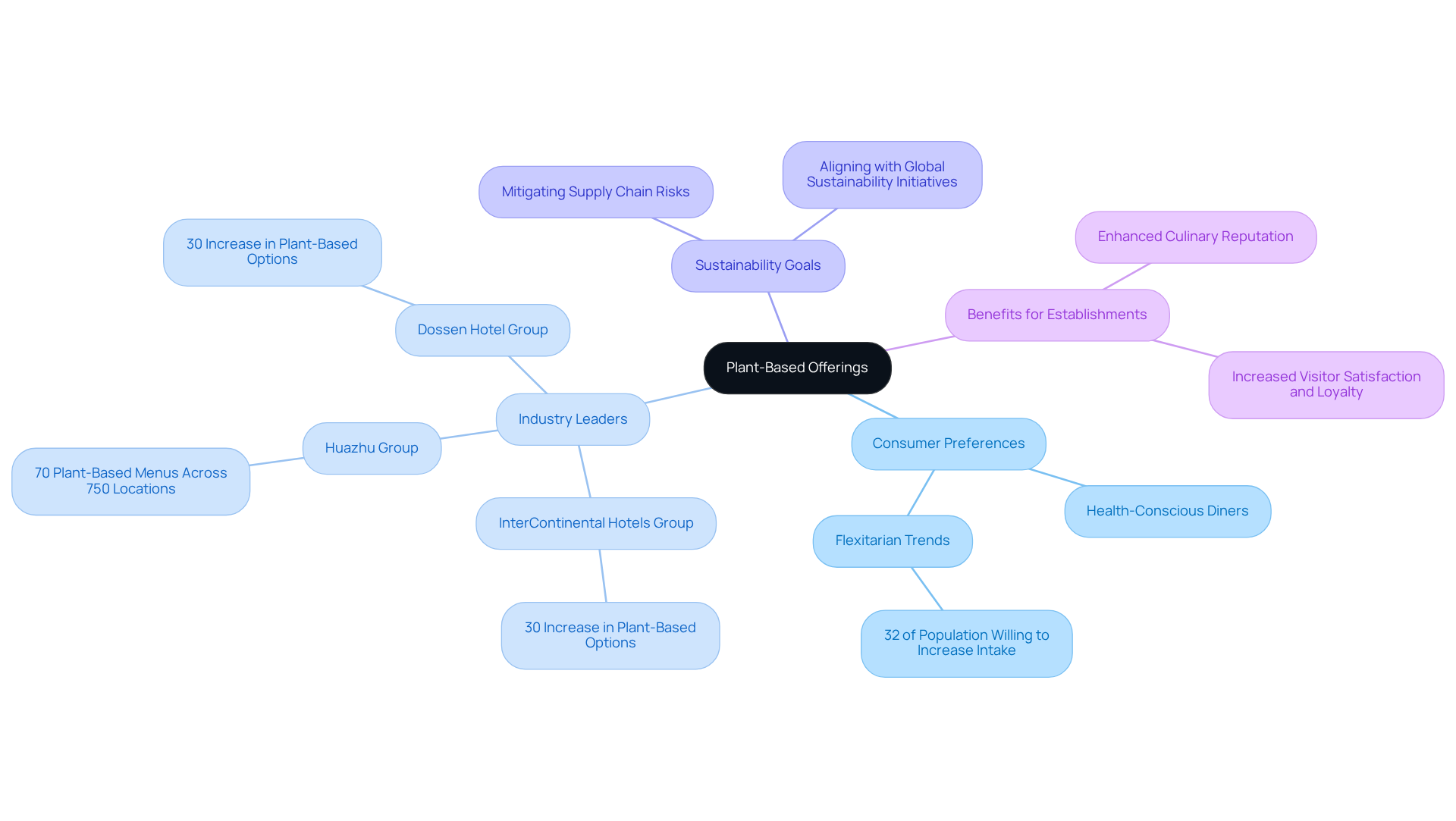
Data-driven insights are essential for optimizing menu offerings in the hospitality industry. By meticulously analyzing sales data alongside visitor feedback, establishments can pinpoint popular dishes and identify areas needing enhancement. This continuous improvement process ensures that menus align with customer preferences while also .
For instance, hotels employing advanced data analysis tools can uncover patterns that drive menu innovation, thereby enhancing the overall dining experience. A prime example is the implementation of self-pour systems, which not only increase revenue but also yield real-time data on beverage consumption. This capability allows for smarter inventory management and timely menu adjustments.
As consumer expectations evolve, leveraging sales data becomes imperative for crafting dining experiences that resonate with patrons, ultimately fostering enhanced loyalty and revenue. Notably, 65% of consumers indicate that personalization is a key driver of loyalty, highlighting the importance of tailoring menu offerings based on data insights.
Furthermore, monitoring food and beverage revenue and waste through self-serve options can significantly mitigate waste while simultaneously improving guest satisfaction and sales revenue, as evidenced by the successful deployment of self-pour systems at Hampton Inn & Homewood Suites Boston Seaport.
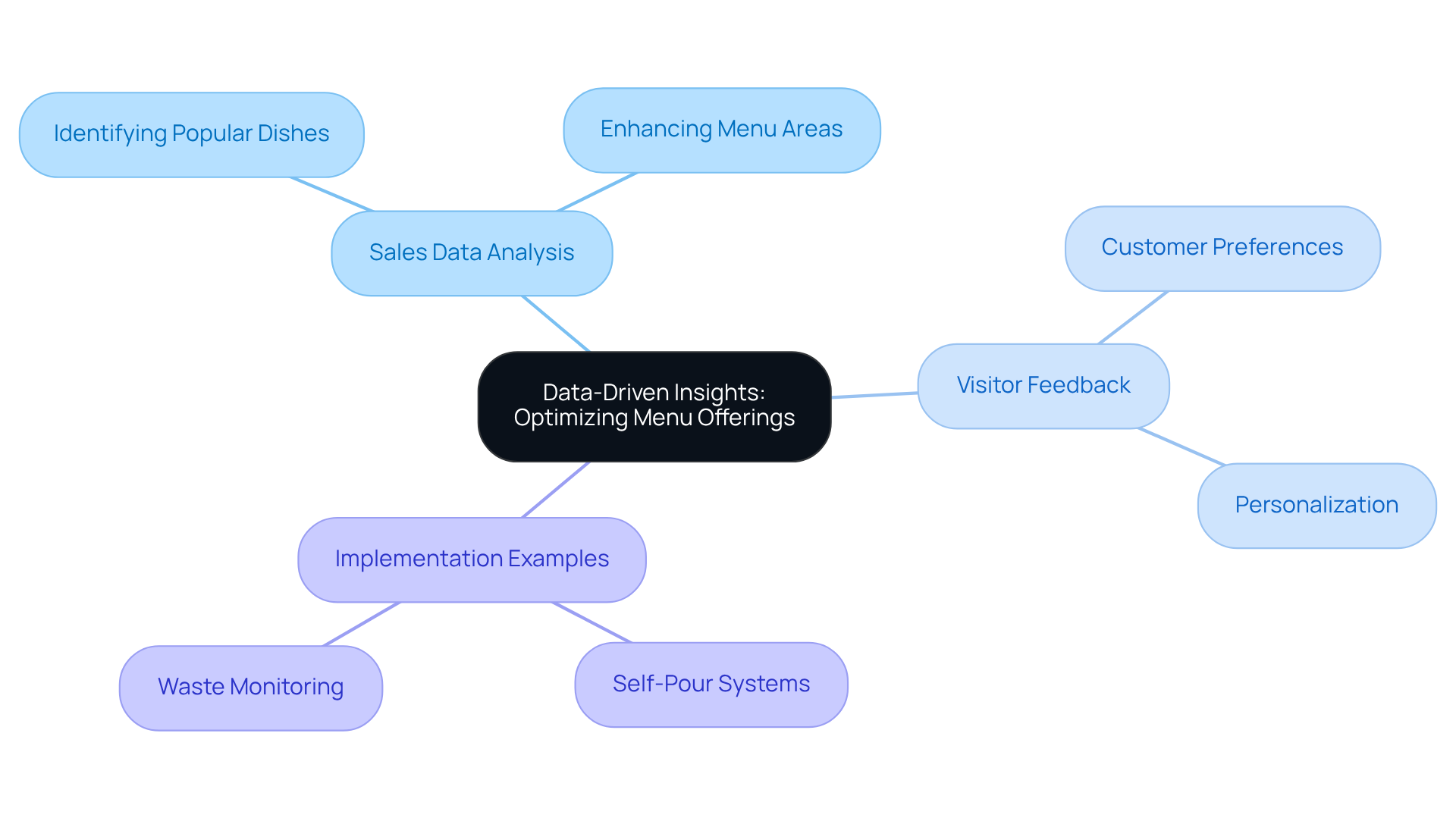
The food and beverage sector within the hospitality industry is experiencing a profound transformation, propelled by emerging trends that align with the evolving preferences of modern consumers. Emphasizing sustainability, technology integration, and personalized dining experiences is essential for hotels and restaurants aiming to excel in this competitive landscape. By adopting innovative strategies such as eco-friendly sourcing, data-driven insights, and experiential dining, establishments can significantly enhance guest satisfaction while securing a formidable competitive advantage.
Key insights from the article underscore the critical importance of aligning with consumer demands, including the rising preference for health-conscious and plant-based options, alongside an increasing desire for authentic, local culinary experiences. The integration of technology—from mobile ordering to real-time data analytics—empowers hospitality businesses to optimize their operations and effectively tailor their offerings to meet guest expectations. Moreover, forming local partnerships not only enhances menu authenticity but also supports the surrounding community.
In conclusion, the trends shaping the food and beverage hotel industry highlight the necessity for establishments to continuously adapt and innovate. By embracing these trends, hotels can meet the demands of today’s conscientious travelers while paving the way for sustainable growth and future success. Establishments should actively seek to implement these strategies, as the commitment to sustainability, technology, and personalized experiences represents not merely a trend but a fundamental shift in consumer expectations that will redefine the hospitality landscape moving forward.
What is Lights On and how does it transform revenue management in hospitality?
Lights On is an innovative approach that revolutionizes revenue management in the hospitality industry through advanced analytics and customized strategies. It focuses on effective pricing optimization and demand generation, allowing hotels and restaurants to adapt their offerings based on market trends.
How does Lights On benefit clients in the hospitality sector?
By leveraging data-driven insights, clients can make strategic decisions that enhance occupancy rates and revenue streams. This leads to improved financial performance by identifying opportunities and addressing challenges in a competitive landscape.
What role does real-time data analysis play in revenue management?
Real-time data analysis facilitates dynamic pricing adjustments, enabling establishments to remain agile and responsive to market fluctuations, which ultimately drives profitability.
What is sustainable sourcing in the hospitality industry?
Sustainable sourcing prioritizes eco-friendly ingredients to mitigate environmental impact. It involves forming partnerships with local farms and suppliers to procure fresh, organic produce, enhancing menu quality and supporting community engagement.
Why is sustainable sourcing important for modern travelers?
A 2021 study revealed that 81% of travelers plan to select sustainable accommodation options, highlighting the importance of eco-conscious practices in attracting contemporary consumers who prioritize sustainability in their travel choices.
How does local sourcing affect visitor satisfaction?
Incorporating local sourcing enhances menu quality and boosts visitor satisfaction, as travelers increasingly seek authentic and responsible dining experiences.
What competitive advantage does sustainable sourcing provide?
Adopting sustainable sourcing strategies can yield a competitive edge, as 71% of C-suite leaders believe that ESG (Environmental, Social, and Governance) investment represents a competitive advantage for their companies.
How is technology integrated into food service operations in the hospitality industry?
Technology integration, such as mobile ordering apps, enhances efficiency and customer experience by allowing guests to place orders from their devices, streamlining the ordering process and reducing wait times.
What percentage of Gen Z adults are comfortable using mobile ordering apps?
82% of Gen Z adults express comfort in placing orders at limited-service eateries via smartphone applications, indicating the growing importance of this technology in enhancing customer satisfaction.
How do data analysis tools benefit food and beverage operations?
Data analysis tools help establishments understand customer preferences, allowing them to tailor menus and services to meet evolving demands, ultimately fostering loyalty and encouraging repeat visits.
Transform your group booking strategies with Lights On and watch your occupancy soar.